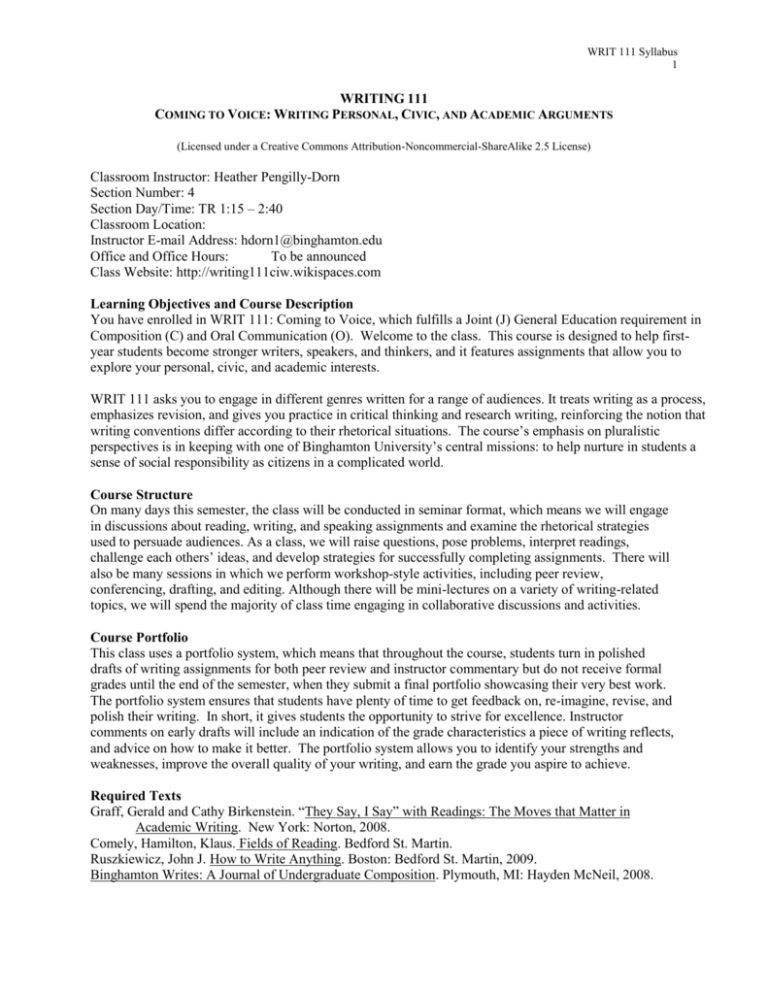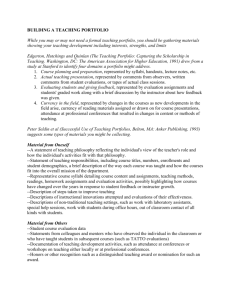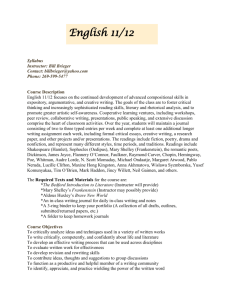syllabus section 4 - writing111CIW
advertisement

WRIT 111 Syllabus 1 WRITING 111 COMING TO VOICE: WRITING PERSONAL, CIVIC, AND ACADEMIC ARGUMENTS (Licensed under a Creative Commons Attribution-Noncommercial-ShareAlike 2.5 License) Classroom Instructor: Heather Pengilly-Dorn Section Number: 4 Section Day/Time: TR 1:15 – 2:40 Classroom Location: Instructor E-mail Address: hdorn1@binghamton.edu Office and Office Hours: To be announced Class Website: http://writing111ciw.wikispaces.com Learning Objectives and Course Description You have enrolled in WRIT 111: Coming to Voice, which fulfills a Joint (J) General Education requirement in Composition (C) and Oral Communication (O). Welcome to the class. This course is designed to help firstyear students become stronger writers, speakers, and thinkers, and it features assignments that allow you to explore your personal, civic, and academic interests. WRIT 111 asks you to engage in different genres written for a range of audiences. It treats writing as a process, emphasizes revision, and gives you practice in critical thinking and research writing, reinforcing the notion that writing conventions differ according to their rhetorical situations. The course’s emphasis on pluralistic perspectives is in keeping with one of Binghamton University’s central missions: to help nurture in students a sense of social responsibility as citizens in a complicated world. Course Structure On many days this semester, the class will be conducted in seminar format, which means we will engage in discussions about reading, writing, and speaking assignments and examine the rhetorical strategies used to persuade audiences. As a class, we will raise questions, pose problems, interpret readings, challenge each others’ ideas, and develop strategies for successfully completing assignments. There will also be many sessions in which we perform workshop-style activities, including peer review, conferencing, drafting, and editing. Although there will be mini-lectures on a variety of writing-related topics, we will spend the majority of class time engaging in collaborative discussions and activities. Course Portfolio This class uses a portfolio system, which means that throughout the course, students turn in polished drafts of writing assignments for both peer review and instructor commentary but do not receive formal grades until the end of the semester, when they submit a final portfolio showcasing their very best work. The portfolio system ensures that students have plenty of time to get feedback on, re-imagine, revise, and polish their writing. In short, it gives students the opportunity to strive for excellence. Instructor comments on early drafts will include an indication of the grade characteristics a piece of writing reflects, and advice on how to make it better. The portfolio system allows you to identify your strengths and weaknesses, improve the overall quality of your writing, and earn the grade you aspire to achieve. Required Texts Graff, Gerald and Cathy Birkenstein. “They Say, I Say” with Readings: The Moves that Matter in Academic Writing. New York: Norton, 2008. Comely, Hamilton, Klaus. Fields of Reading. Bedford St. Martin. Ruszkiewicz, John J. How to Write Anything. Boston: Bedford St. Martin, 2009. Binghamton Writes: A Journal of Undergraduate Composition. Plymouth, MI: Hayden McNeil, 2008. WRIT 111 Syllabus 2 Required Materials You will need a stapler and consistent access to a working computer and printer. While BU students have limited printing privileges in campus computer “PODs,” you are responsible for budgeting your printing needs. It is recommended that you buy a $10.00 supplemental printing card, which can be purchased at Bartle Library and other campus locations. If you print more than your weekly POD quota, you can rely on your card to print materials for WRIT 111. WRITING ASSIGNMENTS: Literacy Autobiography: This assignment asks you to reflect on your own literacy or literacies. Each of you bring to the class individual experience and knowledge about literacy in different discourse communities. We will start the unit by developing a more cohesive idea of what a discourse community is and explore the kinds of literacies that are employed by these discourse communities. For the paper, you will each construct a literacy autobiography to explore your place within your various literacy groups. The shape your literacy autobiography takes will depend on what literacies you explore and how you choose to explore them. You may wish to develop an overview of your literacies for a particular community, focus more deeply on a few, or reflect on one that impacted you the most. This is up to you and may be determined by what your pre-writing and freewriting reveals to you. Rhetorical Analysis: A Rhetorical Analysis asks you to examine the strategies of persuasion within a given text, analyzing and assessing the techniques used in the text. A Rhetorical Analysis often also presents a second argument agreeing or disagreeing with the text. Successful writing in this genre involves reading a text closely to know it well, making strong claims about the text, and then mining the text for evidence to support claims for an analysis. We will be analyzing a visual text. Researched Argument: Building on the skills practiced in the first two assignments, the Researched Argument asks you to collect different kinds of research on a political, social, cultural, or disciplinary issue that interests you. In preparation, you will collect a range of perspectives on the issue by performing library research. You will use this research in creating an academic argument, establishing what has already been written and said, and adding your interpretations and perspectives to the conversation. Your teacher will help you identify appropriate issues and develop an academic research question, but in the end, the focus of your research will be up to you. What is important is that you are invested in the issue you research and the argument you make, that you allow your writing to be a genuine form of inquiry. Opposite Editorial (Op-Ed): This assignment asks you to respond to a public issue in the form of an Opposite Editorial. Unlike an editorial, which represents the collective views of a newspaper’s staff, an Op-Ed represents the views of the writer alone. Engaged citizens write Op-Eds to give their viewpoints public expression. You will have the option of writing your Op-Ed in response to a text we read in class, or a text you find on your own Course Portfolio: In your course portfolio, you will comprehensively revise and resubmit your Researched Argument and two other essays from the course. Because your course portfolio constitutes 70% of your grade, it is important that you revise and polish your writing rigorously, taking into account feedback from peers and your instructor, as well as your own understanding of the grading criteria common to all sections of WRIT 111. Students who fail to integrate significant revision put their overall course grade in jeopardy. WRIT 111 Syllabus 3 COURSE POLICIES: Attendance Requirements It matters that you come to class on time, every day. If you are repeatedly late, it will hurt your participation grade. If you miss more than a week of class, your participation grade will be reduced by a full letter. (That is, more than two classes on a Tuesday/Thursday schedule, or more than three classes on a Monday/Wednesday/Friday schedule.) If you miss more than two weeks of class, you will earn an “F” for your participation grade. You cannot pass the course if you miss more than three weeks of class. Typically, excessive tardiness, early departure, or lack of preparation will result in your being marked absent. If you know you will be absent, ask your instructor if you can turn in work in advance. If you experience a crisis that prevents you from completing your work, speak to your instructor about it, or ask an appropriate campus official to document your situation. (Instructors cannot accept doctors’ notes to excuse absences.) You would be wise to reserve an absence or two for everyday illnesses or other unpredictable events such as failed alarm clocks, transportation problems, unforeseen travel, etc. Drafting Requirements, Due Dates, and Deadline Extensions To pass the course, you must turn in drafts of all major assignments on the days they are due. This is part of your participation grade. You may not turn in late homework assignments, but you may turn in work in advance. If you anticipate needing a deadline extension for an assignment draft, you may request one a week in advance of due dates. Teachers have the right to deny deadline extensions, and/or implement appropriate penalties when you turn in late work. Classroom Participation I expect you to be in every class, on time, fully prepared. You are expected to fulfill all homework requirements. Invest yourself in readings and discussions—doing so will pay off in your writing. Because one of the objectives of WRIT 111 is to make you comfortable engaging in different forms of public discourse—both written and oral—you should make an effort to add your voice to discussions during every class. While joining classroom conversations is difficult for some, not doing so may negatively impact your grade. Workshop, Peer Critique, and Sharing Your Work When you meet in workshop groups to get feedback on your writing, it is your responsibility to have a complete draft and to bring enough copies for everyone in your group; your instructor may also request an additional copy for record keeping. Students who arrive without multiple copies will be marked absent. Sharing your writing is perhaps our single most important course activity. Take peer review seriously and work hard to establish the kind of climate that will make it successful. Occasionally your teacher may request drafts to share with the entire class or with other instructors of WRIT 111. You may decline such requests. All work shared in public settings is treated with respect, with student names removed. Writing Center Visits Please take advantage of the free tutoring services provided by the Writing Center, which is located in Library North 2412. Tutors work with writers at all stages of the writing process. For more information, visit <http://writingcenter.binghamton.edu/index.html>. Staying in Touch Think of your instructor as someone who is on your side and willing to help, and contact your instructor if you have questions, concerns, or difficulties. Check e-mail daily so your instructor can stay in touch with you, too. Most instructors use the Blackboard course page to update students about classroom activities and homework assignments; you should use Blackboard as a resource for WRIT 111 information. WRIT 111 Syllabus 4 Plagiarism and Binghamton’s Academic Honesty Code A primary goal of this class is to teach you how to use and document sources appropriately. If you have questions, please do not hesitate to ask. Any violation of the Academic Honesty Code, however, constitutes plagiarism, which can result in failure of the course or suspension from the University. The Academic Honesty Code defines plagiarism as: Presenting the work of another person as one’s own work (including papers, words, ideas, information, computer code, data, evidence-organizing principles, or style of presentation of someone else taken from the Internet, books, periodicals or other sources). This includes: quoting, paraphrasing, or summarizing without acknowledgement, even a few phrases; failing to acknowledge the source of a major idea or ordering principle central to one’s work; relying on another person’s data, evidence or critical method without credit or permission; submitting another person’s work as one’s own or using unacknowledged research sources gathered by someone else. (http://bulletin.binghamton.edu/integrity.htm) FEEDBACK AND GRADING: How Instructors Give Feedback in WRIT 111 WRIT 111 teachers use a portfolio approach to grade student writing. This means that your teacher not only responds to your writing in various stages of progress throughout the semester, but that you may revise your work until the very last day of class. As a result, you have the opportunity to produce your very best work. You will also have multiple opportunities to get feedback from your teacher and your classmates, and are encouraged to seek feedback from Writing Center tutors, friends in your residential communities, and others. At the end of each assignment unit, you will turn in a polished draft, and your instructor will carefully respond to it, noting what you have done well, possible strategies for improvement, and the grade characteristics your draft currently reflects. This draft grade, however, is not a recorded grade. At the end of the semester, you will resubmit your Researched Argument and two other revised assignments in your course portfolio, which constitutes 70% of your course grade. Portfolio Team Grading1 Your course portfolio will be evaluated by your teacher, as well as at least one additional WRIT 111 instructor. The portfolio “team grading” system brings instructors together for productive small-group discussions of teaching and grading. It encourages the development of community standards for the four basic letter grades and allows students to select which papers will represent the bulk of their grade. The portfolio system encourages instructors to coach their students through the term as students draft and revise papers for possible inclusion in the portfolio. The team grading system ensures that the grades students receive are representative of the community standards endorsed by the First-Year Composition Program as a whole, rather than standards developed by individual instructors who grade in isolation. At the end of the semester, students submit a course portfolio, which includes revised versions of their very best work. Course portfolios are graded with a simple letter grade: A, B, C, or D. (Fs are reserved for students who miss class too many times, who do not complete assignment guidelines or do not submit all assignments and drafts, or who do not submit course portfolios.) Classroom instructors then adjust these simple grades (with a plus, a minus, or no adjustment) to reflect students’ improvement and engagement in the course. The course portfolio grade—the grade agreed upon by at least two teachers—constitutes 70% of the student’s letter grade in the course. 1 The Binghamton University Writing Initiative adapted this model of assessment from one fine-tuned by Roger Gilles and Daniel Royer. We gratefully acknowledge Gilles and Royer, whose ideas have been used and whose language has been modified in the creation of this document. WRIT 111 Syllabus 5 Class Participation: 10% of course grade ~ 100 points Includes timely completion of assignment drafts, homework, and your overall participation in the course. Percentage breakdowns are as follows: A AB+ B BC+ C CD F 93-100 points 90-92 points 87-89 points 83-86 points 80-82 points 77-79 points 73-76 points 70-72 points 60-69 points >60 points Oral Presentations: 20% of course grade ~ 200 points Includes two oral presentations (10% or 100 points each). A AB+ B BC+ C CD F 186-200 points 180-185 points 174-179 points 166-173 points 160-165 points 154-159 points 146-153 points 140-145 points 120-139 points >120 points Course Portfolio: 70% of course grade ~ 700 points Includes your final revised drafts of three assignments, one of which must be your Researched Argument. A AB+ B BC+ C CD F 651-700 points 630-650 points 609-629 points 581-608 points 560-580 points 539-559 points 511-538 points 490-510 points 420-489 points >420 points Course Grading Scale: 1000 points total A AB+ B BC+ C CD F 930-1000 points 900-929 points 870-899 points 830-869 points 800-829 points 770-799 points 730-769 points 700-729 points 600-699 points >600 points Course Portfolio Due on the Last Day of Class: Thursday, December 10 or Friday, December 11, 2009 Course Portfolios for WRIT 111 must be submitted to your instructor on the last day of class. Late portfolios are not accepted. There is no final examination in WRIT 111.





